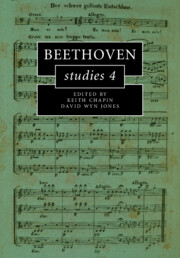Book contents
- Beethoven Studies 4
- Beethoven Studies 4
- Copyright page
- Contents
- Figures
- Contents
- Music Examples
- Contributors
- Preface
- Abbreviations
- 1 From the Chapel to the Theatre to the Akademiensaal: Beethoven’s Musical Apprenticeship at the Bonn Electoral Court, 1784–1792
- 2 Gracious Beethoven?
- 3 Beethoven’s Unfinished Symphonies
- 4 Beethoven as Sentimentalist
- 5 Beethoven’s Nature: Idealism and Sovereignty from an Ecocritical Perspective
- 6 (Cross-)Gendering the German Voice
- 7 Beethoven and Tonal Prototypes: An Inherited and Developing Relationship
- 8 Shared Identities and Thwarted Narratives: Beethoven and the Austrian Allgemeine musikalische Zeitung, 1817–1824
- 9 Composing with a Dictionary: Sounding the Word in Beethoven’s Missa solemnis
- 10 Deafly Performing Beethoven’s Last Three Piano Sonatas
- Index of Beethoven’s Works
- General Index
9 - Composing with a Dictionary: Sounding the Word in Beethoven’s Missa solemnis
Published online by Cambridge University Press: 26 September 2020
- Beethoven Studies 4
- Beethoven Studies 4
- Copyright page
- Contents
- Figures
- Contents
- Music Examples
- Contributors
- Preface
- Abbreviations
- 1 From the Chapel to the Theatre to the Akademiensaal: Beethoven’s Musical Apprenticeship at the Bonn Electoral Court, 1784–1792
- 2 Gracious Beethoven?
- 3 Beethoven’s Unfinished Symphonies
- 4 Beethoven as Sentimentalist
- 5 Beethoven’s Nature: Idealism and Sovereignty from an Ecocritical Perspective
- 6 (Cross-)Gendering the German Voice
- 7 Beethoven and Tonal Prototypes: An Inherited and Developing Relationship
- 8 Shared Identities and Thwarted Narratives: Beethoven and the Austrian Allgemeine musikalische Zeitung, 1817–1824
- 9 Composing with a Dictionary: Sounding the Word in Beethoven’s Missa solemnis
- 10 Deafly Performing Beethoven’s Last Three Piano Sonatas
- Index of Beethoven’s Works
- General Index
Summary
While the unprecedented ambition of Beethoven Missa solemnis is routinely acknowledged by scholars, it is also characterized by outlooks that admit to a certain perplexity. One kind of primary evidence for the composer’s attitude to text setting in the work has been ignored: the extensive use of two contemporaneous printed volumes, a German translation of the Ordinary by Ignatius Aurelis Feßler and a Latin–German dictionary by Immanuel Gerhard Scheller. Study of these sources not only re-affirms the centrality of the text for Beethoven but also reveal the origins of many of the very individual, even eccentric, responses to particular words and phrases.
- Type
- Chapter
- Information
- Beethoven Studies 4 , pp. 189 - 208Publisher: Cambridge University PressPrint publication year: 2020



